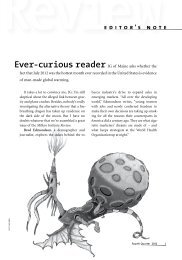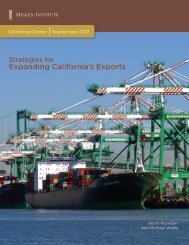The Rise and Fall of the U.S. Mortgage and Credit ... - Milken Institute
The Rise and Fall of the U.S. Mortgage and Credit ... - Milken Institute
The Rise and Fall of the U.S. Mortgage and Credit ... - Milken Institute
You also want an ePaper? Increase the reach of your titles
YUMPU automatically turns print PDFs into web optimized ePapers that Google loves.
Issues for Policymakers<br />
What type <strong>of</strong> regulatory reform will minimize, if not entirely eliminate, asset price booms <strong>and</strong> busts,<br />
which are so destructive to wealth accumulation <strong>and</strong> economic activity?<br />
Clearly, more <strong>of</strong> <strong>the</strong> effort to reform <strong>the</strong> regulation <strong>of</strong> financial institutions <strong>and</strong> markets must be channeled<br />
toward preventing crises ra<strong>the</strong>r than implementing reforms after <strong>the</strong>y occur. <strong>The</strong>re were early <strong>and</strong> ample<br />
signals—acknowledged by <strong>the</strong> regulatory authorities—that a housing price bubble was emerging. <strong>The</strong>se signals<br />
should have triggered regulatory actions to tighten overly loose credit policies <strong>and</strong> to curtail <strong>the</strong> excessive use <strong>of</strong><br />
leverage that was becoming common throughout <strong>the</strong> financial system.<br />
A greater emphasis on liquidity, credit, <strong>and</strong> capital leverage is needed, paying greater attention to both on- <strong>and</strong><br />
<strong>of</strong>f-balance-sheet assets. Regulators should also focus on <strong>the</strong> degree to which both on- <strong>and</strong> <strong>of</strong>f-balance-sheet<br />
assets, or subsets <strong>of</strong> important assets, are positively correlated with one ano<strong>the</strong>r, regardless <strong>of</strong> where <strong>the</strong>y are<br />
located in <strong>the</strong> financial system. In o<strong>the</strong>r words, if one financial institution is experiencing difficulties that stem<br />
from one particular type <strong>of</strong> asset, it is important to determine whe<strong>the</strong>r o<strong>the</strong>r institutions have similar holdings<br />
<strong>and</strong> address that risk proactively throughout all <strong>of</strong> <strong>the</strong> institutions.<br />
A regulatory regime must be designed to address <strong>the</strong> broad issues <strong>of</strong> systemic risks.<br />
Do differences in <strong>the</strong> size or composition <strong>of</strong> financial sectors in countries necessitate different<br />
regulatory regimes?<br />
<strong>The</strong> recent crisis has underscored <strong>the</strong> fact that financial systems in different countries are interconnected. <strong>The</strong><br />
turmoil that swept through <strong>the</strong> U.S. financial sector quickly ensnared o<strong>the</strong>r countries around <strong>the</strong> world. It is<br />
crucial that <strong>the</strong> G-20 nations, in particular, work toge<strong>the</strong>r to coordinate regulatory policies that can prevent<br />
emerging crises from deepening <strong>and</strong> spreading across national borders.<br />
<strong>The</strong> challenge is to design a regulatory regime that promotes greater cross-country cooperation while allowing<br />
for national differences in financial systems. This also requires a reassessment <strong>of</strong> whe<strong>the</strong>r <strong>the</strong>re should be a<br />
supranational regulator or whe<strong>the</strong>r bigger roles should be assigned to international organizations such as <strong>the</strong><br />
Basel Committee on Banking Supervision <strong>and</strong> <strong>the</strong> International Monetary Fund.<br />
35















